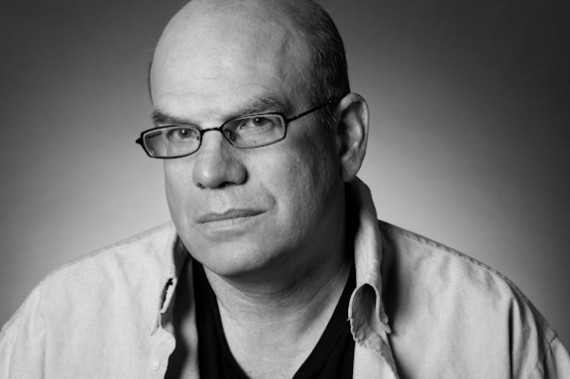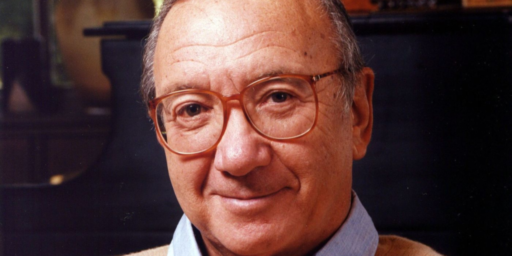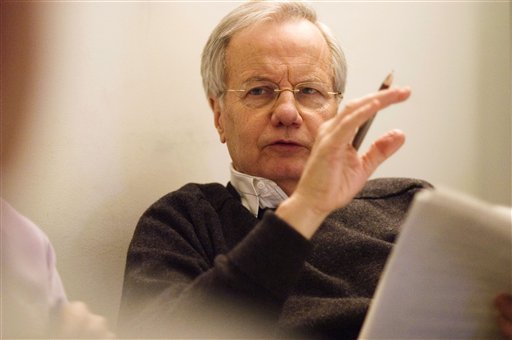David Simon on the Drug War, the Underclass, and America’s Dark Side
David Simon on the drug war, the underclass, and America's seamy underbelly.
Bill Moyers interviews David Simon, creator of The Wire, for Guernica. Some excerpts:
Bill Moyers: What is it about the crime scene that gives you a keyhole, the best keyhole perhaps, into how American society really works?
David Simon: You see the equivocations. You see the stuff that doesn’t make it into the civics books, and you also see how interconnected things are. How connected the performance of the school system is to the culture of a street corner. Or where parenting comes in. The decline of industry suddenly interacts with the paucity and sort of fraud of public education in the inner city. Because The Wire was not a story about America, it’s about the America that got left behind.
[…]
David Simon: One of the themes of The Wire really was that statistics will always lie. Statistics can be made to say anything. You show me anything that depicts institutional progress in America: school test scores, crime stats, arrest reports, anything that a politician can run on, anything that somebody can get a promotion on, and as soon as you invent that statistical category, fifty people in that institution will be at work trying to figure out a way to make it look as if progress is actually occurring when actually no progress is.
[…]
Bill Moyers: Many people could see what you saw simply if we opened our eyes. And yet the drug war keeps getting crazier and crazier, from selling guns to Mexico’s drug cartel to cramming more people into prison even though they haven’t committed violent crimes. Why don’t the policies change?
David Simon: Because there’s no political capital in it. There really isn’t. The fear of being called soft on crime, soft on drugs. The paranoia that’s been induced. Listen, if you could be draconian and reduce drug use by locking people up, you might have an argument. But we are the jailing-est country on the planet right now. Two million people in prison. We’re locking up less-violent people. More of them. The drugs are purer. They haven’t closed down a single drug corner that I know of in Baltimore for any length of time. It’s not working. And by the way, this is not a Republican-Democrat thing, because a lot of the most draconian stuff came out of the Clinton administration, this guy trying to maneuver to the center in order not to be perceived as leftist by a Republican Congress.
[…]
Bill Moyers: It’s also clear from your work that you think the drug war has destroyed the police.
David Simon: That’s the saddest thing in a way, again, because the stats mean nothing. Because a drug arrest in Baltimore means nothing. Real police work isn’t being done. In my city, the arrest rates for all major felonies have declined, precipitously, over the last twenty years. From murder to rape to robbery to assault.
Because to solve those crimes requires retroactive investigation. They have to be able to do a lot of things, in terms of gathering evidence, that are substantive and meaningful police work. All you have to do to make a drug arrest is go in a guy’s pocket. You don’t even need probable cause anymore in Baltimore. The guy who solves a rape or a robbery or a murder, he has one arrest stat. He’s going to court one day. The guy who has forty, fifty, sixty drug arrests, even though they’re meaningless arrests, even though there’s no place to put them in the Maryland prison system, he’s going to go to court forty, fifty, sixty times. Ultimately, when it comes time to promote somebody, they look at the police computer. They’ll look and they’ll say, “This guy made forty arrests last month. You only made one. He’s the sergeant” or “That’s the lieutenant.” The guys who basically play the stat game, they get promoted.
[…]
The people most affected by this are black and brown and poor. It’s the abandoned inner cores of our urban areas. As we said before, economically, we don’t need those people; the American economy doesn’t need them. So as long as they stay in their ghettos and they only kill each other, we’re willing to pay for a police presence to keep them out of our America. And to let them fight over scraps, which is what the drug war, effectively, is.
Simon’s hyperbolic on some of this. Most notably, his notion that there’s some grand conspiracy in which white oligarchs are deliberately using the drug war and the criminal justice system to keep down an underclass that they don’t need, is absurd. The sad fact of the matter is that most of working class America, much less the high achievers that make up the political and executive class, simply have no real experience with the world Simon saw as a reporter in Baltimore’s inner city. A world where children are essentially left to raise themselves, with few viable role models, is just unfathomable to most of us.
But Simon’s right about the futility and cynicism of the drug war as it’s being waged. While the business about our incarceration rates being higher than those of many despotic regimes is absurd, it’s long since been obvious that the system is not achieving its goals of keeping kids off drugs and cleaning up the streets of our urban centers.
via Anne Laurie







I think David Simon is broadly right, and I can suffer the word “conspiracy” even when it is technically a bit more of a “dynamic” (or multiple dynamics).
We have distracted voters who want to be hard on crime. We have a jails-industrial complex. We have bankers happily laundering billions.
What was it, Wachovia paid a $110 million forfeiture and a $50 million fine?
That might border on conspiracy after all.
A “grand conspiracy”… perhaps not. but the effective results are pretty much the same as if it were. Look at the percentage of adult black males that are in the criminal justice system, and compare it to the percentage for whites. Unless you think blacks are simply somehow predisposed to crime, something is going on here.
Ahh, but I’m sure there are many people who think just that…
There doesn’t need to be a grand conspiracy. If you set up the wrong incentives, people will spontaneously behave the same way they would if there were a conspiracy.
It’s the first rule of quantitative management: What gets measured is what gets done.
If it’s so absurd, why did you invent it and put it in Simon’s mouth? He does not say there’s a conspiracy.
You leave out the last sentence of the last paragraph you quote, for some reason:
And what he was referring back to, from earlier in the interview:
We have created a system which perpetuates this. There needn’t be a conspiracy, and Simon doesn’t claim there is one. There only need be complacency. That is in abundance.